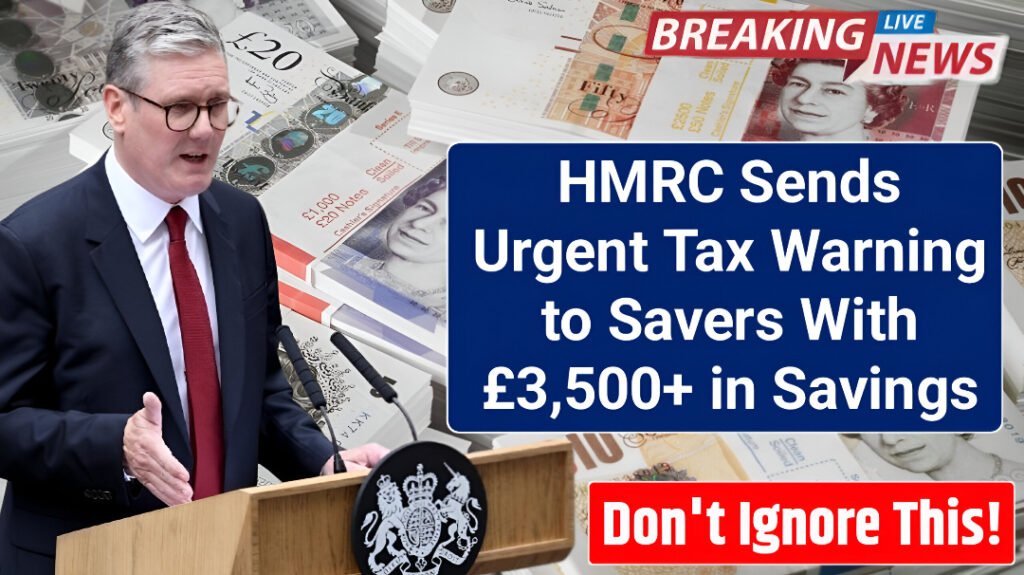Hello Everyone, If you’re a saver in the UK, there’s some important news you can’t ignore. HMRC has issued an urgent warning, and it could affect anyone earning more than £3,500 a year in savings interest. With interest rates climbing, many people are unknowingly crossing tax-free limits, leaving them at risk of an unexpected bill. So, what exactly does this warning mean, and how can you make sure you’re not caught out? Let’s break it down.
Why HMRC Is Warning Savers
In recent years, interest rates were so low that very few people ever worried about tax on their savings. But things have changed. Higher interest rates now mean even ordinary savers are making more money on deposits. That’s good news in one sense, but it also means more people are breaching the Personal Savings Allowance and slipping into taxable territory.
What Is the Personal Savings Allowance?
The allowance is the amount of savings interest you can earn without paying tax. It’s set differently depending on your tax band:
-
Basic rate taxpayers (20%) – £1,000 allowance
-
Higher rate taxpayers (40%) – £500 allowance
-
Additional rate taxpayers (45%) – £0 allowance
Anything you earn beyond this will be taxed, usually collected automatically by HMRC through your tax code.
Why £3,500 Matters Now
The figure of £3,500 is key because, with current interest rates around 4–5%, it doesn’t take much to reach this point. For example, £70,000 saved at 5% earns £3,500 in interest per year. Even people with modest savings could now be pushed past their allowance, meaning they’ll need to pay extra tax.
Who Could Be Affected Most
This warning doesn’t apply to everyone equally. Some groups are at much higher risk:
-
Retirees relying on cash savings for income
-
Families keeping large emergency funds in banks
-
Higher rate taxpayers with even small savings pots
-
Savers who are unaware of the tax rules
If you’re in one of these categories, it’s worth double-checking your interest earnings before HMRC comes knocking.
How HMRC Collects the Tax
Most people won’t get a separate tax bill in the post. Instead, HMRC often adjusts your tax code to collect what’s owed automatically. That means you might notice less take-home pay from your salary or pension. If you’re self-employed or your bank doesn’t report your savings interest, you may need to file a Self-Assessment tax return instead.
How to Reduce the Impact
The good news is there are smart ways to reduce or even avoid paying unnecessary tax on savings:
-
Use an ISA (Individual Savings Account) – all interest here is tax-free.
-
Share savings between partners – each gets their own allowance.
-
Check your tax band – changes in income can shift your allowance.
-
Spread savings across accounts with lower rates if you’re close to the limit.
-
Speak to a financial adviser for tailored advice.
Public Concerns
Not surprisingly, the announcement has worried many savers. Retirees, in particular, feel they are being punished for years of careful saving. Others argue that the current allowance is outdated and doesn’t reflect today’s interest rate environment. Campaigners have already called on the government to raise the allowance so ordinary savers aren’t unfairly taxed.
What This Means for Everyday Savers
For most people, the impact will depend on their income and savings pot. Someone with £10,000 in savings may still be safe. But households with larger cash reserves, or those who’ve just sold a property and parked money in a bank, could easily tip over the allowance. Staying informed is the key to avoiding surprises.
Could the Rules Change Again?
With growing pressure from savers and MPs, there’s a chance the government may review these rules in the future. Some experts believe the Personal Savings Allowance should be increased to match current economic conditions. Until then, though, the safest approach is to keep a close eye on your interest and make the most of tax-free accounts.
FAQs on HMRC’s Tax Warning
1. What is the current savings allowance?
-
£1,000 for basic rate taxpayers, £500 for higher rate, and none for additional rate.
2. Why is HMRC focusing on £3,500?
-
At today’s interest rates, this is the level where many savers cross into taxable interest.
3. Will I get a letter if I owe tax?
-
Usually, HMRC adjusts your tax code automatically, but in some cases you may get a direct notice.
4. Can ISAs be taxed?
-
No, all money held in ISAs remains completely tax-free.
5. Do pensioners need to worry?
-
Yes, especially those relying on large cash savings to fund retirement.
6. Do I need to file a tax return for savings?
-
Only if your interest is significant or your bank doesn’t report it automatically.
7. Could the allowance rise in the future?
-
It’s possible, but there are no official announcements yet.
Conclusion
HMRC’s urgent tax warning is a reminder that higher interest rates come with hidden risks. If your annual savings interest is more than £3,500, there’s a real chance you could face a tax bill. By understanding your Personal Savings Allowance, making use of ISAs, and keeping an eye on your income, you can protect your money and avoid unwelcome surprises.
Disclaimer : This article is for general information only and is not financial advice. Tax rules can change, and everyone’s situation is different. Always check the official HMRC website or speak to a qualified financial adviser for guidance based on your circumstances.
